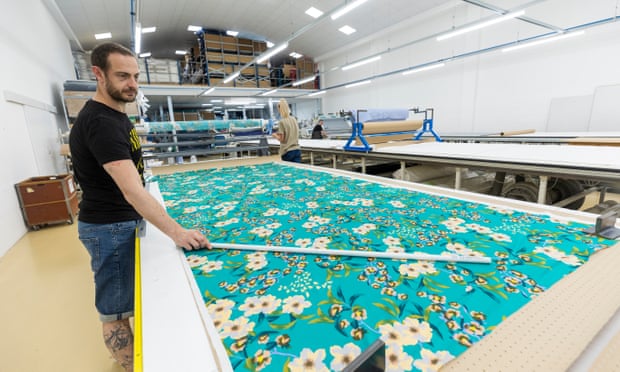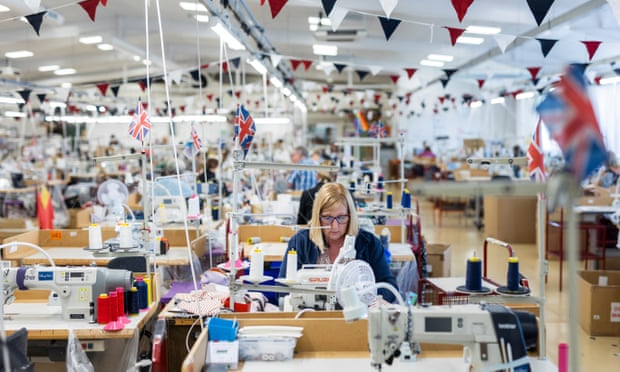Manufacturing’s coming home: UK fashion boss champions ‘reshoring’ | Manufacturing sector
[ad_1]
On a hot summer’s day in Derbyshire, Christopher Nieper is worried about getting cloth from Shanghai to his factory in the former mining town of Alfreton.
For three months over the spring and early summer he had a container full of fabric stuck in the port of Shanghai while the Chinese city was locked down because of Covid. Eventually, to avoid waiting any longer, he paid an extra €5,000 (£4,200) to have it air freighted, first to France, and then on to the East Midlands.
“I had customers who ordered in March saying: ‘Where is my dress? I’m going to have to cancel it.’”
Now the owner of David Nieper, the family-run business named after his father that has been making womenswear, knitwear and lingerie in the town since 1961, is looking closer to home for its vital materials.
“You can turn three months into one week,” he says. “Think of the environment, saving the energy needed to bring something all that way around the world. Think of the time saved, of the wastage being avoided, of the customer satisfaction.”
In response to severe disruption caused by Covid shutdowns in China and Russia’s invasion of Ukraine, more than a third of UK manufacturers have increased the number of suppliers they use, according to a survey by the industry group Make UK. More than three-quarters of these companies are increasing their use of UK suppliers.
“The seismic shocks of the last few years have created a potent cocktail of factors which has turned business models upside down,” says Verity Davidge, director of policy at the manufacturers’ body. “For many companies this will mean leaving ‘just in time’ behind and embracing ‘just in case.’”
However, the trend is far from straightforward, with questions over the higher production costs and Britain’s capacity to meet reshoring demand after decades of industrial decline and underinvestment. For many firms – especially those with major markets on the other side of the globe – turning to UK suppliers will make little sense.
“Companies need to be confident they are maintaining the requirements for product quality, availability and cost with being close to their customers and suppliers,” Davidge adds.
“Textile skills have become almost extinct from western Europe,” says Nieper. “The reason more onshoring hasn’t happened is there aren’t any factories left to onshore to.”
As firms across Britain struggle with soaring inflation, trade disruption and severe staff shortages, the boss of the clothes manufacturer is taking matters into his own hands, with a novel attempt to fix the country’s supply constraints. Or at least Alfreton’s.
Nieper has thrown his weight behind the local school, hoping to invest in a future generation of workers as one of the few business backers of an academy trust in Britain. Renamed the David Nieper Academy in 2016, the school once ranked among the worst in the country has grown to become the sixth most oversubscribed in Derbyshire, with almost 800 students.
As with the JCB Academy in neighbouring Staffordshire – backed by the digger maker and other businesses including Bentley Motors, Network Rail and Rolls-Royce – the idea is that closer links with education could help British industry grow.
“Everyone complains, saying: ‘You can’t get workers.’ Well they just need to go on and do something about it,” says Nieper. He recognises that businesses getting involved in education can be controversial (“The town was sceptical. What’s a private employer doing coming along?”) but says supporting the school is one way to help level up the local economy.
“If you fail a generation of children, you’ll collapse the economy of a town. It’s a slow burn as they’re growing up if it’s not fixed,” he says, describing Alfreton as a “classic forgotten town”, where kids tend to want to leave when they grow up. “If a school fails for 10 years it’s going to affect the whole economy, leaving people with low educational attainment and low aspirations.”

More progress must be made. The school received a “requires improvement” rating from Ofsted at its most recent inspection in May 2019 – although it won praise for the “tireless” work of its headteacher, Kathryn Hobbs.
“Children might not have the opportunities they have in other areas, but it’s our job to make it happen,” says Hobbs, who grew up close to Alfreton but was one of the many who left. She came back to take on the challenge of turning the school around.
Textiles once formed the backbone of the industrial revolution, with former mining and mill towns like Alfreton at the industry’s heart. Today, however, as few as 3% of clothes worn in Britain are manufactured domestically. With globalisation enabling the offshoring of production, and amid a shift across advanced economies towards service sector activity, UK manufacturing has shrunk from more than a quarter of the economy in the 1970s to about 10% today.
The idea that Britain no longer makes things was among the many reasons former industrial towns voted overwhelmingly for Brexit. Spying an opportunity, Boris Johnson visited the David Nieper factory in 2016 on the Brexit campaign trail, using it to stitch together a Vote Leave flag in the workshop. He cracked jokes about the EU being a “badly designed undergarment” and quipped: “Knickers to all those who talk Britain down.”
UK exports to the EU collapsed by 40% in the first month after Johnson’s deal was introduced. Despite a recovery, the country’s trade performance still lags behind comparable advanced economies. Hardly helping British manufacturing, post-Brexit border problems and red tape are driving up costs for businesses, while tougher migration rules have exacerbated worker shortages.

On a walk around the David Nieper factory sites, dotted across Alfreton, there are few non-English voices to be heard. Nieper says there are some Polish and Lithuanian workers, while there are three Ukrainian refugees now at the school. He is proud to employ a mainly locally born workforce. “It’s much better if you can grow the economy from within the town.”
Nieper has faced disruption and higher costs since Brexit, but its boss says sales to France and Germany remain strong. Because its products are made in Britain, they qualify for zero-tariff status when sold in the EU, unlike the clothes originally produced in Asia that many rivals export. Most British retailers, however, sell garments made overseas, leading to a collapse in UK clothing exports to the EU.
“With Brexit it’s been difficult to get supplies in. With Covid and now with supply chain problems you can’t get anything in, so we decided to bring it home,” explains Nieper.
Despite his optimism, big retailers are sceptical about the chances of a widespread return for wholly domestic supply chains. Nieper might be able to sell dresses for about £150 each – reflecting higher salaries and production costs than abroad – to a largely older, affluent demographic. But it won’t be affordable for everyone.
Archie Norman, chair of Marks & Spencer, told the high street giant’s annual shareholder meeting that he would love to get more products from the UK, but “realistically we have got to be cost competitive, and we have lost the skillset” for domestic manufacturing. On a large scale I don’t think we will see [British clothing manufacturing] any time soon,” he said.
With Brexit uncertainty, the coronavirus pandemic and political chaos at the heart of government, business investment of the kind required to boost the supply capacity of the UK’s industrial base has flatlined. Spending remains 10% below pre-Covid levels. The government’s independent economic forecaster estimates there will be a 2% long-term hit to productive capacity from Brexit.

Nieper believes more companies need to get serious about investing in Britain to counter these headwinds. He is also critical of M&S for being part of the problem, having offshored its supply chain in recent decades to match fast fashion competitors. Such moves had a big impact on the Midlands and north of England, historically the home of the textiles industry.
“When they went offshore, those factories closed, and everything else fell down like a pack of cards.”
Things might be starting to change. M&S is testing the production of some of its Jaeger brand clothes in the UK, while most of the furniture it sells is made in Wales and half of its own-label beauty products are produced domestically.
Consumers are growing more conscious of the environmental and ethical consequences of fast fashion. The industry’s carbon footprint is huge, with Oxfam estimating that making all the jeans owned in Britain was responsible for carbon emissions equivalent to flying a plane around the world more than 2,300 times.
While reshoring could cut air miles and help British industry, there are concerns that Britain’s typically higher production costs could mean higher prices or less choice for hard-pressed consumers.
It is a challenge Nieper says must be overcome. “The secret of us becoming a more prosperous nation is to start adding value [through more manufacturing]. But we need a massive reskilling.
“You have to ratchet it up slowly. It won’t happen in one go. But if we lift them all it would help the country at large.”
[ad_2]
Source link


